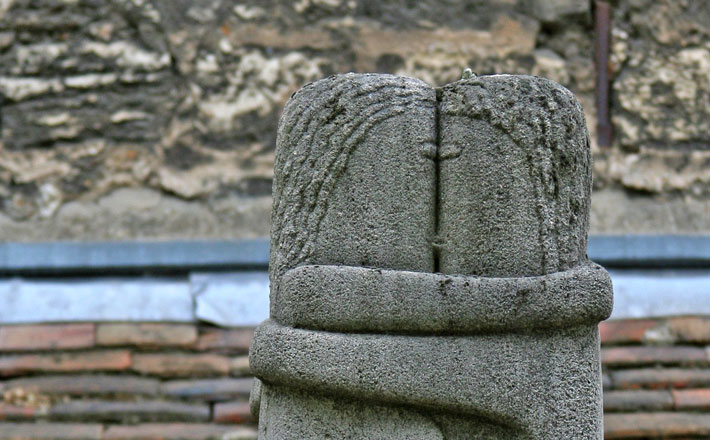Commentary on 2 Peter 3:8-15a
“Are we there yet?” People will soon begin their holiday travels. In trains, planes, and automobiles countless children will ask this question as “over the river and through the woods” they go to visit family and friends.
“Are we there yet?” I suspect that I drove my parents crazy with that question, and I suspect I began to ask it only a block or two away from our home. Patience is never a virtue of youth. Apparently, as the author of this letter also discovered, neither was patience a virtue of many early Christians. I think I can understand why.
Each week they gathered to tell the stories of Jesus’ life, ministry, his death, resurrection, and his ascension, his return to the Father. They also reminded each other that the story was not over. They recalled what Jesus had told them, he would return. There will come a time Jesus told us, when “the sun will be darkened and the moon will not give its light … ” (Mark 13:24). All will be in turmoil and chaos and in that time they “will see ‘the Son of Man coming in clouds’ with great power and glory” (Mark 13:26).
Could there be any better news? They were not going to have to endure these challenging times much longer. Jesus had declared to his people “this generation will not pass away until all these things have taken place” (Mark 13:30). Jesus would return and it would seem to be soon. His angels would soon come and “gather his elect from the four winds, from the ends of the earth to the ends of heaven” (Mark 13:27). They would not be at the mercy of their enemies and oppressors much longer. They would be swept up into the glories of heaven and their troubles would soon be over. Sounds wonderful, doesn’t it?
“Soon and very soon,” but how soon was soon? How long, really, were they going to have to wait for this wonderful day? That they did not know; Jesus did not tell them. In fact, he reminded them, “But about that day or hour no one knows, neither the angels in heaven, nor the Son, but only the Father” (Mark 13:32). So they waited and waited and waited. Like the holiday travelers they asked, “Are we there yet?”
As the anticipation for Christmas builds and all focus is on our celebration of Jesus’ first coming, what do we think about the second coming? Do we, in true Advent tradition, lift up both the first and second comings? Or, are we more like the community to whom the author of this second letter attributed to Peter wrote? Have we returned to our daily, albeit frantic, holiday lives deciding that the talk about Christ’s second coming, the “Day of the Lord” is, well, a fable at best or perhaps even a failure? We are content to sing about the “little town of Bethlehem” (Phillips Brooks) more than we are to believe, “Lo, he comes with clouds descending … God appears on earth to reign” (Charles Wesley).
We know little of this author other than the fact that he sought to place his writing firmly within the traditions of the church by attributing it to the rock upon whom the church was built, Peter. As the first century turned into the second century, perhaps written in the chaos that was Rome at that time, the community was in need of the hope and encouragement found in this letter.
One can almost hear the conversations and arguments that were going on during coffee hour. “Jesus isn’t really coming back you know.” “Do you really still believe that myth?” “Look around you at what is happening, at all of the violence. Do you see God doing anything? I don’t.” “When Jesus ascended, when he returned to the right hand of the Father, that was it. He is not coming back. I don’t care what he said.” “We have waited for seventy years and we could wait seventy times seven and he still won’t come.”
The author wants to convince his community that Jesus will return. He reminds them that God’s time is nothing like our time. They were thinking that seventy years was a long time. Not so, “with the Lord … a thousand years are like one day” (2 Peter 3:8). They shouldn’t, they can’t give up. We who sang of the good news of the Lord’s first coming have placed our lives in the loving hands of a God who “is not slow about his promise” (2 Peter 3:9). Our God keeps his promises and will return in great surprise. Using traditional apocalyptic language, Jesus will come like a thief in the night (2 Peter 3:10; cf. Luke 12:39). Make no mistake; this is neither a fable nor a failure. Jesus will come.
As they, as we, continue to ask the question, “are we there yet?” the author encourages his readers to live lives with the full recognition that the Lord will, indeed, come “with clouds descending.” But living during the “in between time” is not easy. They are to live lives of faithfulness and holiness. They are to live lives of hope in the new creation. They are to live lives of expectation and watchfulness. God will return and they are to be ready. In fact, they might live into that new creation, the new heaven and earth they will find right here and right now.
Like those who lived in the turn from the first to the second century, we also live in equally chaotic, violent times. We may wonder where God is; what is God up to? This Sunday is the 73rd anniversary of the bombing of Pearl Harbor. I suspect for the sailors who were caught up in that conflagration it felt as though the “heavens [were] set ablaze and dissolved … melt[ing] with fire” 2 Peter 3:12). It felt like the end time. We need to hear words of hope and encouragement. So, perhaps, as we live into Advent, the answer to our question, “are we there yet?” might just be yes. We are to sing hymns of God’s coming, of the new creation of love and justice, declaring with confidence that “the day of the Lord will come” (2 Peter 3:10).


December 7, 2014